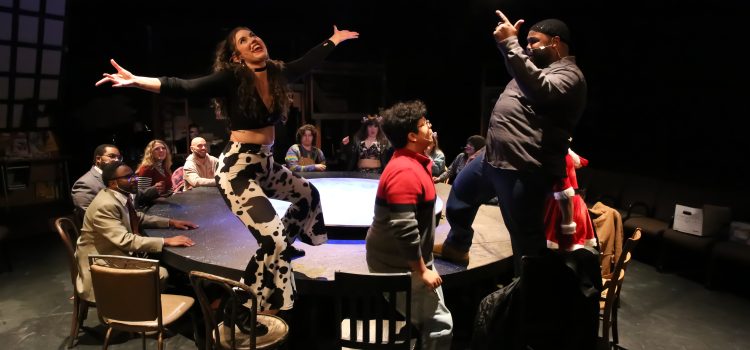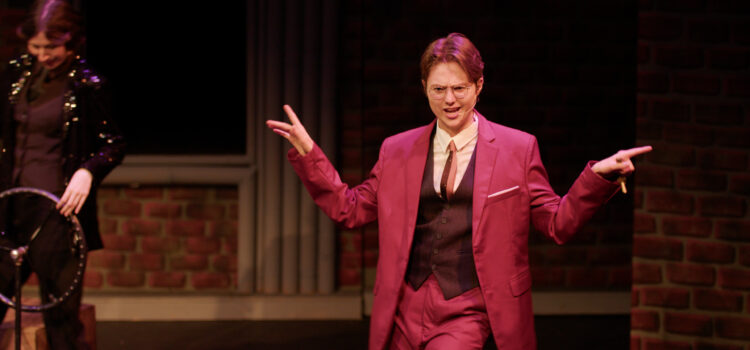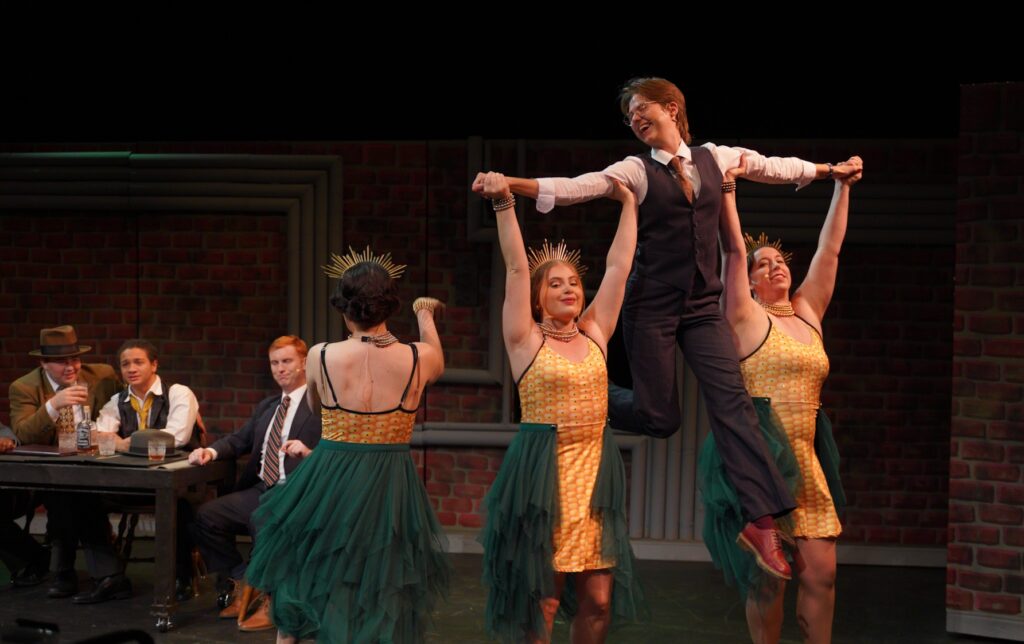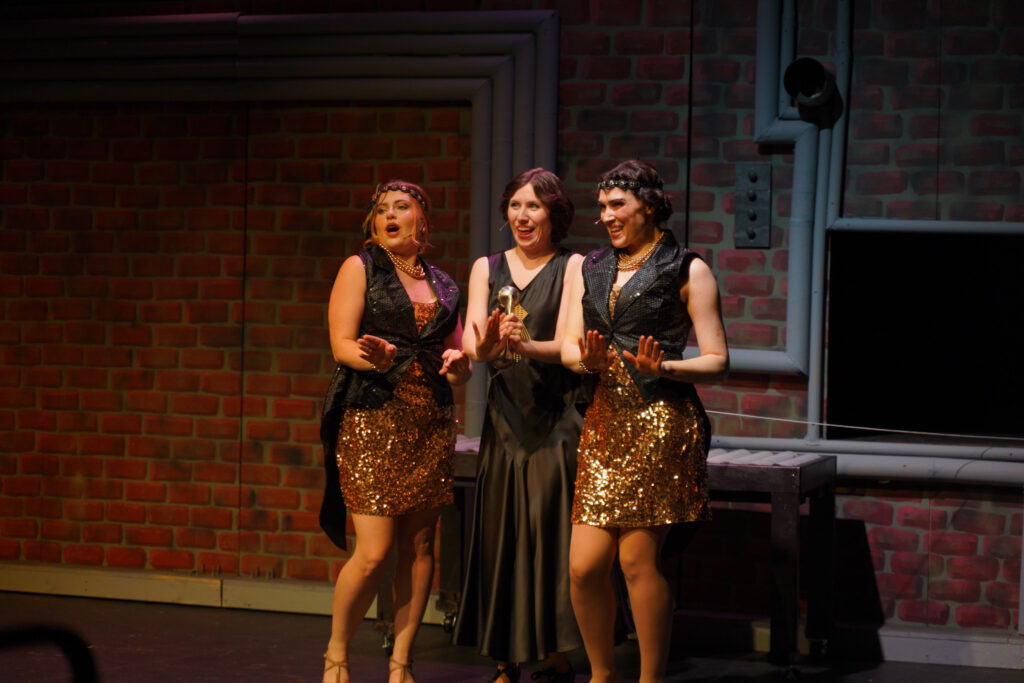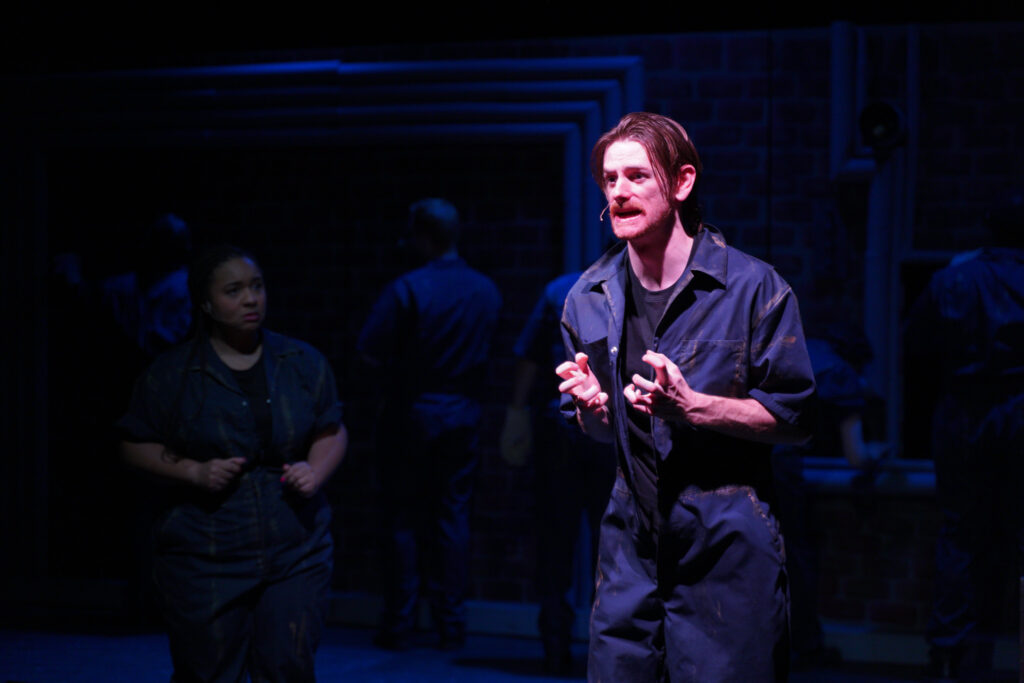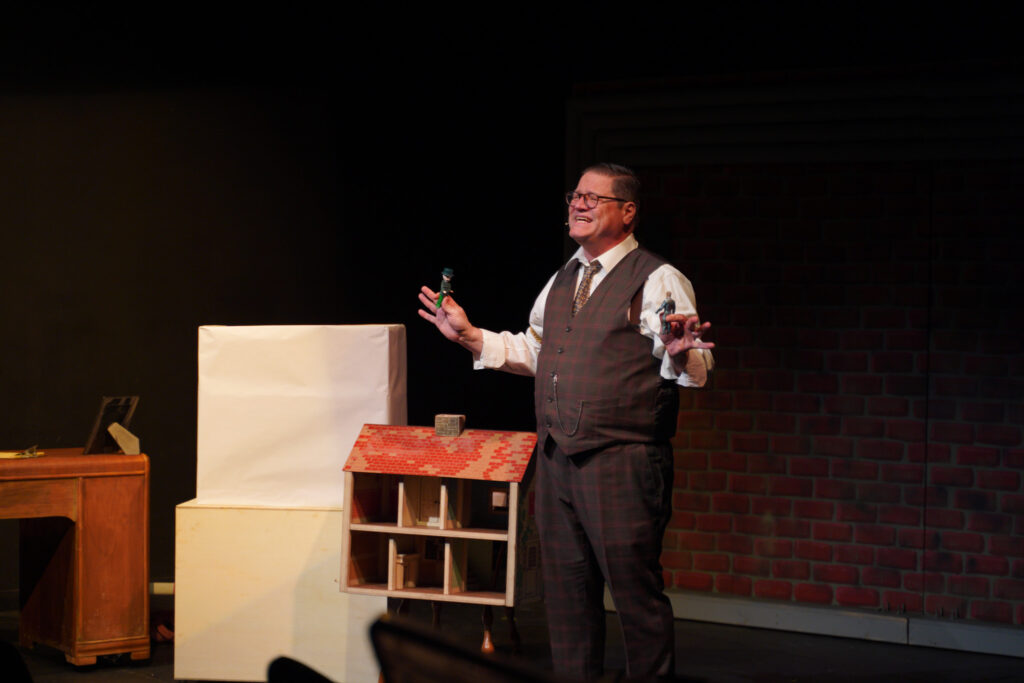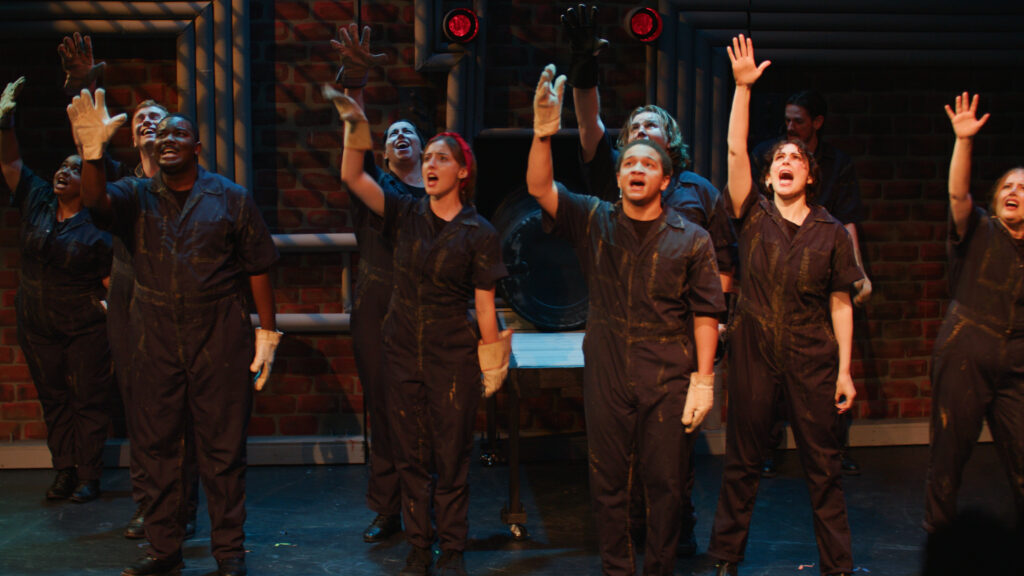By Lynn Venhaus
One of the big-bang bursts in musical theater history, “Rent” is why transformative composer Jonathan Larson endures 30 years after his masterwork spoke to the dreamer in all of us.
Therefore, it’s disappointing when people entrusted to perform his deeply emotional and vocally demanding songs fall short because of repeated off-key issues.
After producing “Rent” in 2014, New Line Theatre has brought it back 11 years later as its 100th show, a milestone achievement in its 33 years. Artistic director Scott Miller, an early Rent-head, enthusiastically co-directed, with assistance from associate artistic director Chris Moore, who also amiably played good-natured anarchist Tom Collins.
Using Puccini’s opera “La Boheme” as his template, Larson set his Gen X characters in New York City’s East Village in the 1990s as they struggled with life, love and HIV/AIDS over the course of a year.
As a struggling artist for many years, Larson knew the world he wrote about, which was based on a concept by Billy Aronson. For making their doubts, anxiety and commitments relatable, emphasizing community and connection, Larson posthumously won the Pulitzer Prize for Drama.

He won three of the show’s four Tony Awards (Musical, Book, Score and Actor in a Featured Role – Wilson Jermaine Heredia as Angel Dumott Schunard) out of 10 nominations.
Tragically, Larson did not live to see the first Off-Broadway preview performance, because he died that day — Jan. 25, 1996, after suffering an aortic dissection. He was 35.
While intentions are noble, because this treasured show resonates with so many, the noticeable aural flaws marred this production’s overall effectiveness. The rock opera’s celebrated reputation, inevitable expectations and music challenges are hard to live up to if key performers can’t stay in tune.
These shortcomings made me wonder what rehearsals were like because the band is sensational, and some of the singers’ soar, but voices allowed to make repeated mistakes didn’t adjust or correct before opening. This performance was a week later.
As is customary, the New Line band was outstanding. Musicians John Gerdes on bass, Clancy Newell on drums, Adam Rugo and Zack Kempen on guitar, and music director Randon Lane and Jason Eschoflen on keyboards were a major asset. But they couldn’t be miracle workers rescuing in-trouble vocalists every time, no matter how often they tried.
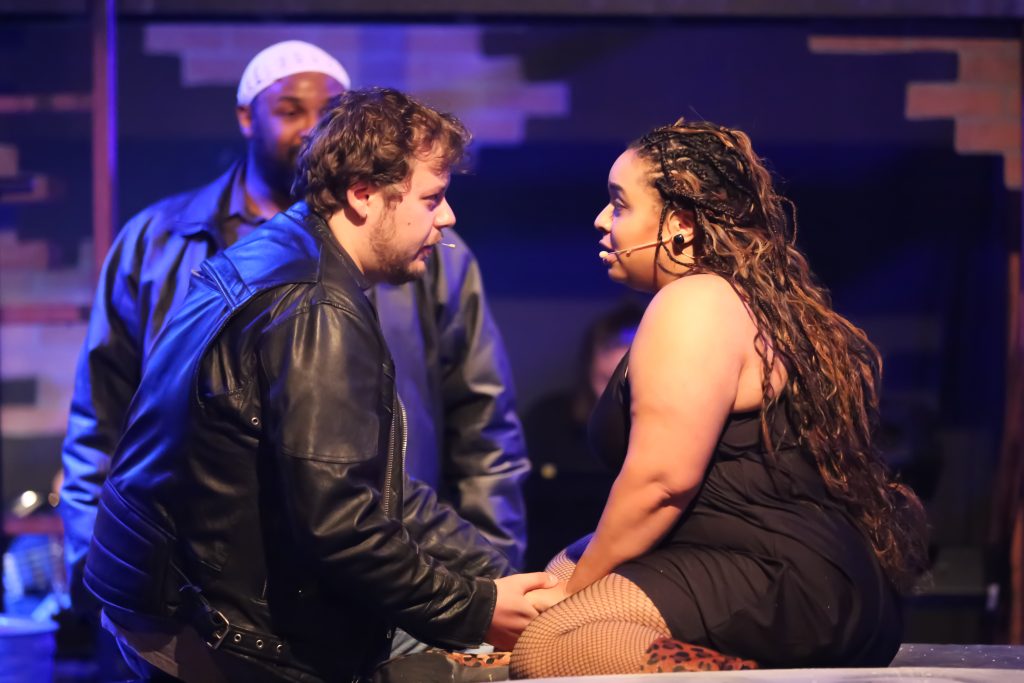
“Rent” features various musical styles. The biggest hurdle were those singers who relied on belting to convey their emotions, but unable to stay on key, wound up screeching,
Corrinna Redford, who played exotic dancer-junkie Mimi Marquez, was erratic vocally and pushed out of her range in “Out Tonight” and “Goodbye Love.” They were messy, breathy and undisciplined, as was “Your Eyes.”
Shouting less, which resulted in a softer interpretation, helped in “Without You” and “I Should Tell You.” Portraying her love interest Roger, Nathan Mecey often went flat when they sang together, thus trying to achieve their spark was difficult.
As lovestruck Collins, Moore fared the best delivery-wise — a sweetly romantic “I’ll Cover You” shared with Angel (and later his heartbreaking reprise) and a hopeful, melodic “Sante Fe.”
With Aarin Kamphoefner as Angel, they displayed the most chemistry of the couple pairings. To their credit, starting with their introduction “You OK, Honey?,” then becoming the positive and compassionate pair did not seem like a stretch.
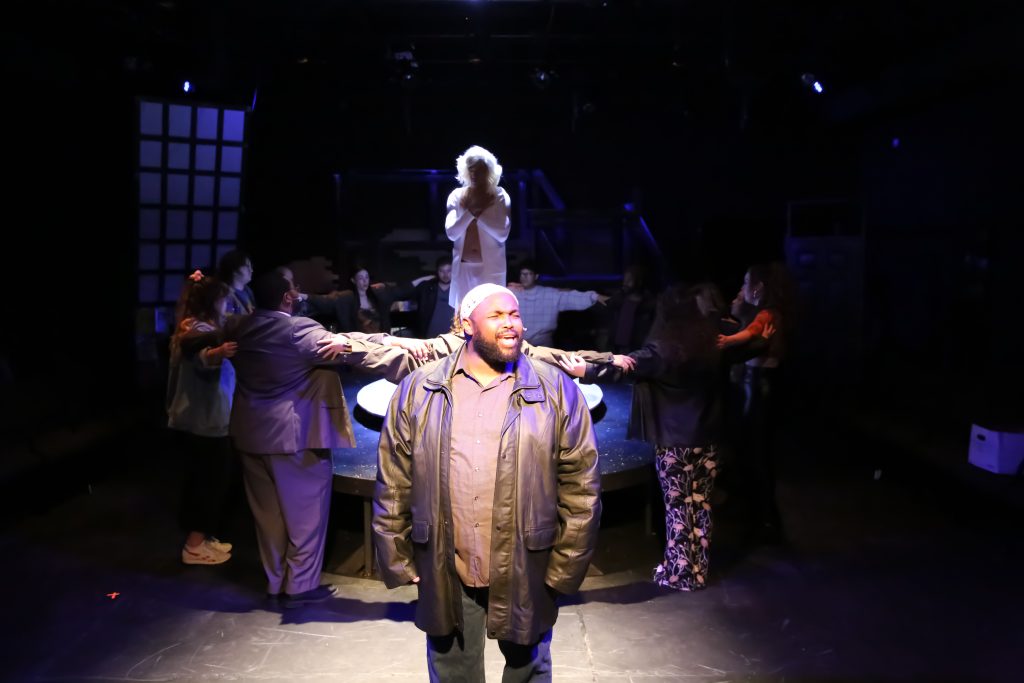
Angel, a street musician and drag queen afflicted with AIDS, is the glue that holds all her friends together. She is such a vibrant life force that when Kamphoefner didn’t go full ebullient RuPaul, you wanted more oomph because she is the life of the party, especially in “Today 4 U” and “Happy New Year.” However, Kamphoefner gave the role its necessary warmth, and was achingly vulnerable in “Will I?”
A too-large circular centerpiece restricted movement, which didn’t help when it came time for the pivotal “Contact,” because Angel’s death was less impactful staged that way, pulling focus away.
In a different choice, he remained on stage afterwards, wearing a white-cream pants ensemble. Usually, Angel’s absence is a big hole that you feel, not see.
As roommates/best friends, aspiring documentary filmmaker Mark Cohen (J. David Brooks) and struggling musician and ex-junkie Roger Davis are tasked with delivering the show’s most dynamic numbers, including “Rent,” which started fine because of the cohesive band’s skills, but veered off-key.
As written, Mark is nerdy and quirky, and Brooks showed the brainy side, if not the skepticism. Roger is complicated because of recent traumas and initially more withdrawn. It’s a tough role to nail, and if there are vocal irregularities, that’s hard to overcome.
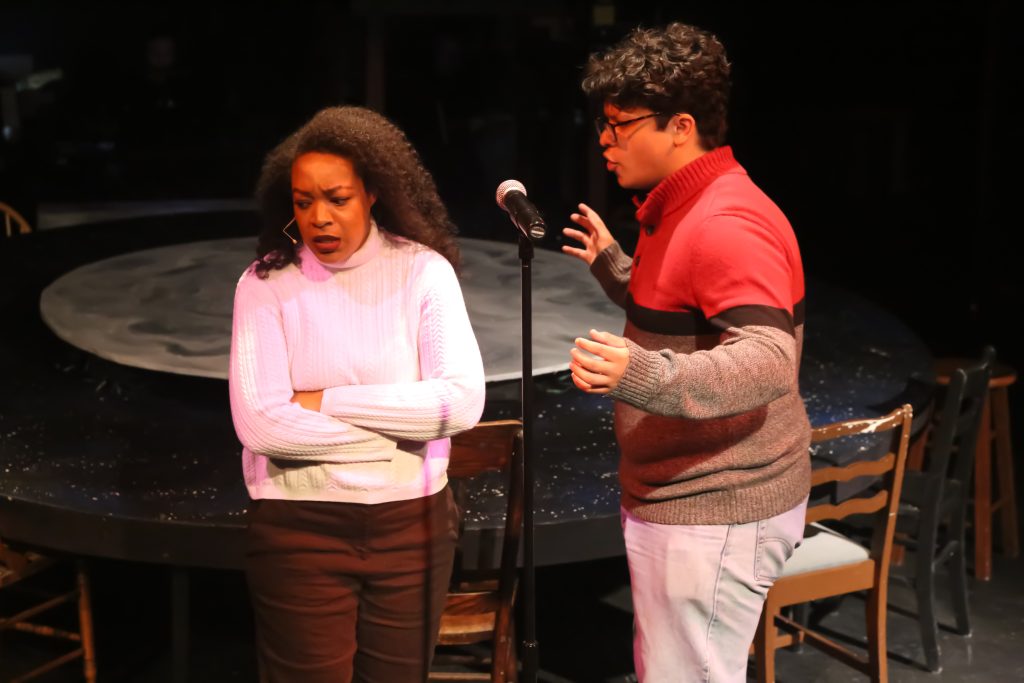
The grand statement “What You Own” could be a vibrant exclamation —although an ongoing issue of their blocking behind the oversized table/platform hampered their delivery, for in that intimate confine, they seemed farther away, especially Roger
While bouncy Sarah Lueken, as self-centered Maureen Johnson, is appealing, capitalizing on being a flirt and using her sexuality, daring and sass, her big number “Over the Moon” could have been bolder and more defiant. The cow print pants were inspired.
As Maureen’s Harvard-educated lawyer girlfriend Joanne Jefferson, Jazmine Kendela Wade was confident, but their song interpretations weren’t convincing.
Because of Brooks’ foot injury, “Tango: Maureen” couldn’t be performed as expected, a playful dance, and “Take Me or Leave Me” lacked verve as well as pitch..
Aaron Tucker played an undistinguished Benjamin Coffin III, former friend turned foe who owns Mark and Roger’s building, married well, and had a fling with Mimi. It’s a stock villain character whose purpose is to advance several conflicts.
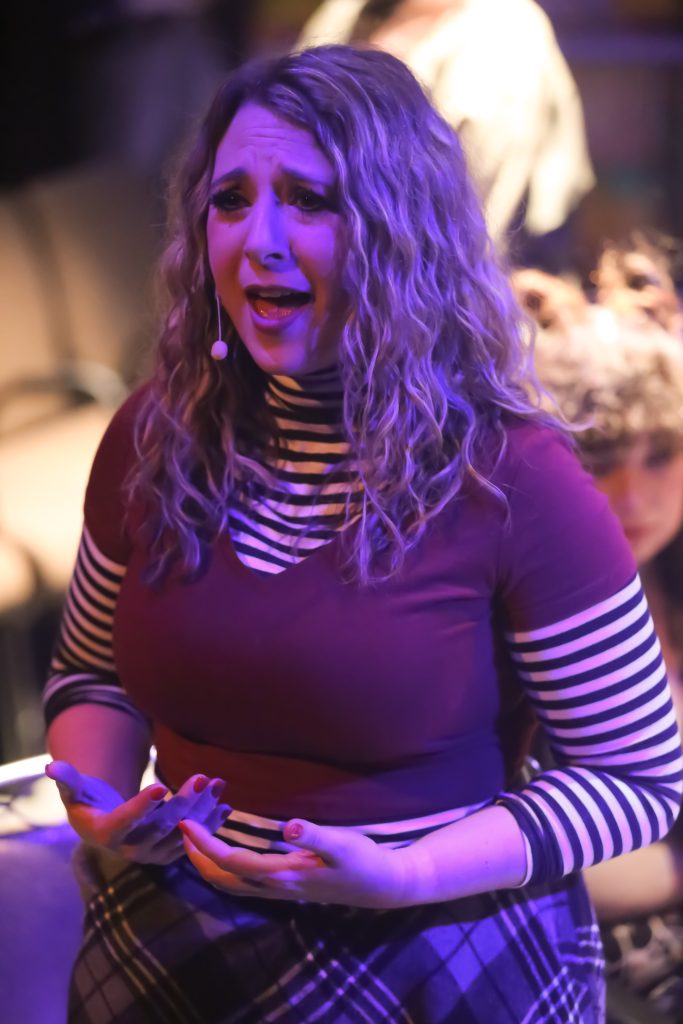
Several fine singers played multiple roles — as parents, marginalized citizens on the streets, AIDs patients, muggers, employers – and understood the complex demands of the music.
Both blending in and standing out were Rafael Da Costa, Lauren Gottreu, Chelsie Johnston, Brittany Kohl, Gabriel Scott Lawrence, Sofia McGrath, Tawaine Noah, and Rachel Parker. Lawrence and Noah were exceptional in “Will I?”
All performers projected earnestness and conviction, often giving off spirited summer camp energy in the ensemble numbers like “La Vie Boheme.”
But when it came time to express yearning, fear, and gut-wrenching sadness, it was not uniform in fervor, and supporting players brought more of the potency in those company numbers.
The signature piece “Seasons of Love” had some wobbly phrasing, but most soloists brought out its potency, especially daCosta and Noah. At first, it was hard to discern who was singing because of their placement.
The set, designed by Todd Schaefer, was a similar set-up that resident set designer Rob Lippert came up with when the first New Line “Rent” was staged at Washington University’s South Campus Theatre (the former CBC High School), which was effective. This tabletop swallowed up so much stage, it made transitions difficult.
Designers adding their personal touches to the overall effect included Zach Thompson, costumes; Ryan Day, sound; and Ryan Thorp, lighting.
The show is meant to be a celebration of life. In 2025 America, AIDS is no longer a death sentence, but because “Rent” captures a specific harrowing time and place, it can feel timeless and universal with its life-and-death themes.
Having seen Puccini’s opera twice, it was interesting to find out how the “Rent” characters closely resembled it – except in a different century and country, Paris in 1830.
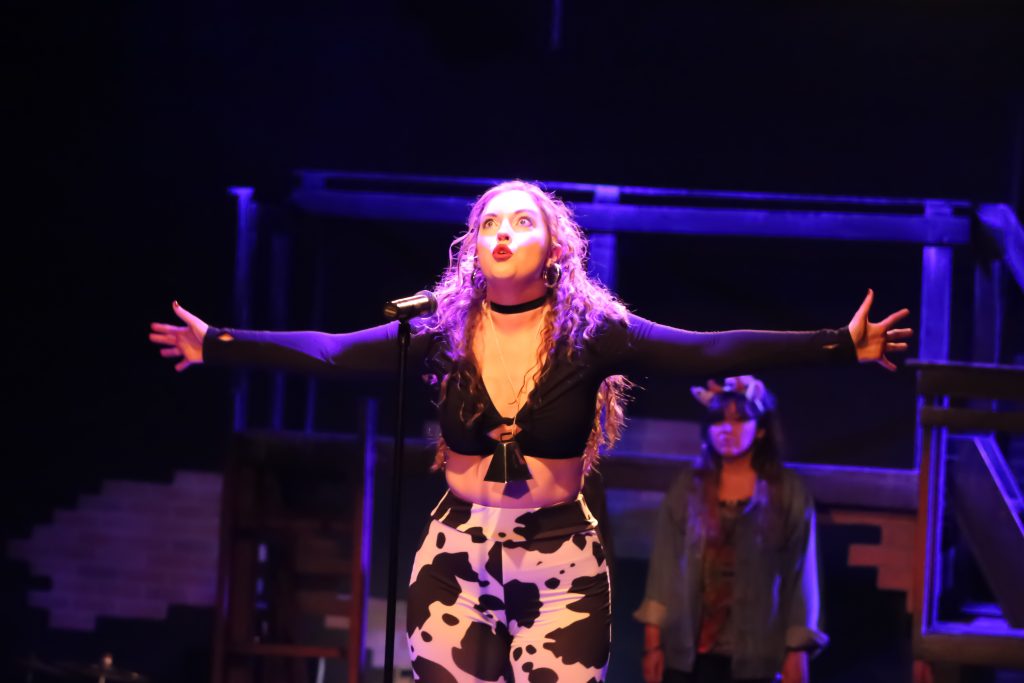
As a longtime fan who has seen “Rent” at least 12 times, starting with the first national tour in 1997, and experiencing chill-inducing Adam Pascal and Anthony Rapp reprise their roles in a 2009 national tour that remains one of the greatest highlights of my theater-going life, it is distressing to hear missteps.
New Line’s shaggy, raw, imperfect production still features moments so dear and emphasizes the evergreen message of “Measure your life in love.”
The cast believed in the dignity and acceptance aspect, that I’m certain of — if only they had devoted more effort to be in tune in service of that glorious score.
The rough spots hampered reaching the heights we expect with “Rent.” Had they all found their voices, this would have been a memorable show for all the right reasons.
New Line Theatre presents “Rent” May 30 – June 21, with Thursday through Saturday performances at 8 p.m. at the Marcelle Theatre, 3310 Samuel Shepard Drive. The musical contains adult content and language and deals with explicit sexual situations. For more information, visit www.newlinetheatre.org
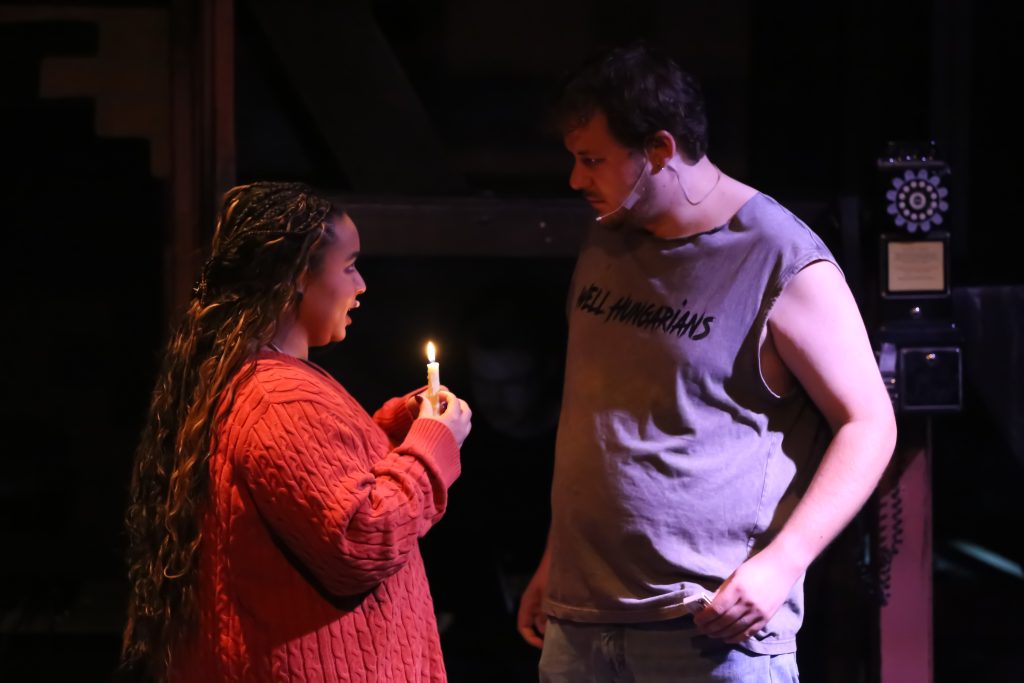

Lynn (Zipfel) Venhaus has had a continuous byline in St. Louis metro region publications since 1978. She writes features and news for Belleville News-Democrat and contributes to St. Louis magazine and other publications.
She is a Rotten Tomatoes-approved film critic, currently reviews films for Webster-Kirkwood Times and KTRS Radio, covers entertainment for PopLifeSTL.com and co-hosts podcast PopLifeSTL.com…Presents.
She is a member of Critics Choice Association, where she serves on the women’s and marketing committees; Alliance of Women Film Journalists; and on the board of the St. Louis Film Critics Association. She is a founding and board member of the St. Louis Theater Circle.
She is retired from teaching journalism/media as an adjunct college instructor.

